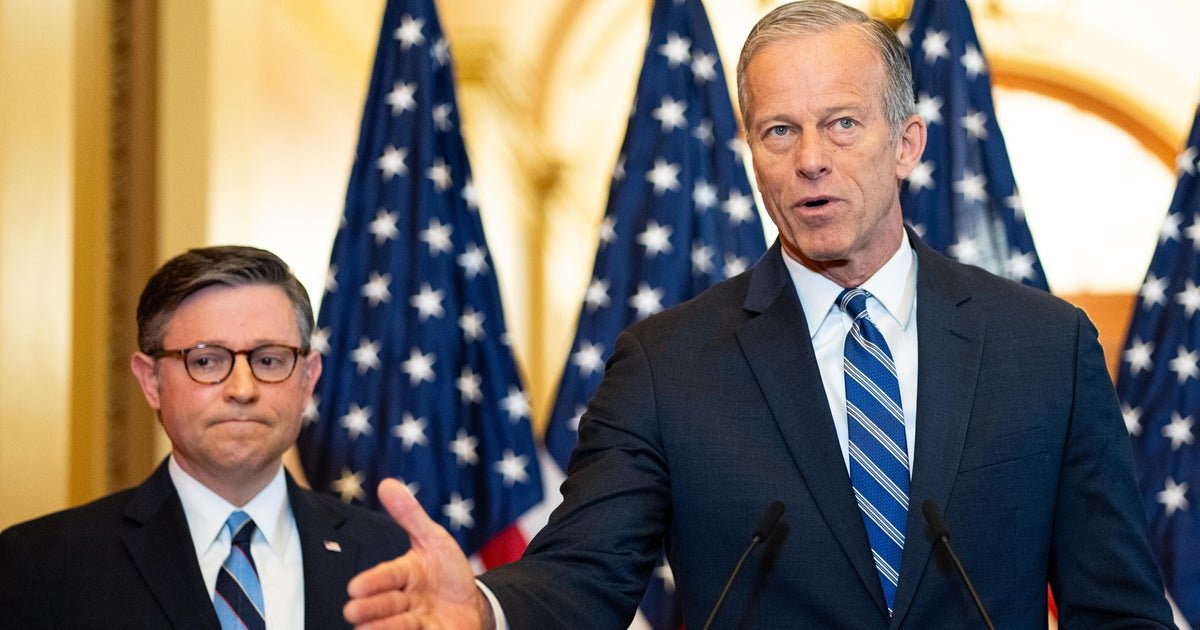[ad_1]
Washington — The Senate will soon be considering the massive legislation containing President Trump’s second-term agenda after House Republicans passed it last week, following days of negotiations over changes to Medicaid, among other key issues.
Senate Republicans will put their “imprint” on the bill, as Senate Majority Leader John Thune put it, and some pointed to changes to Medicaid as a possible red line for those who are undecided. As recently as Memorial Day weekend, at least one, Sen. Susan Collins of Maine, said she’s still going over the House bill: “I’m still looking at it because it kept changing up until literally the very minute it passed.”
Medicaid is the popular entitlement program that provides government-sponsored health care for low-income Americans and people with disabilities. The federal government shares the costs of the program with states, shouldering a minimum of 50% of the costs for richer states, while contributing more for the poorest. In 2025, it paid 77% of the Medicaid costs for Mississippi.
Here’s what to know about the changes to Medicaid in the House measure and the reaction so far by some GOP senators who have said they’re concerned about the Medicaid provisions:
Potential Republican opposition in the Senate
Some of the House’s Medicaid provisions may face resistance in the Senate. And with a narrow majority, Senate Republicans can only afford to lose three of their members if everyone votes.
Collins and Sen. Lisa Murkowski of Alaska, who have been willing to break with their party on certain issues, say changes to Medicaid must not hurt their states. And the two senators, along with Sen. Josh Hawley of Missouri, supported an amendment to the budget resolution that would have removed the language instructing the committee that oversees Medicaid from finding $880 billion in cuts. That amendment failed.
In a New York Times OpEd earlier this month, Hawley called “slashing health insurance for the working poor” both “morally wrong and politically suicidal.” And although he’s outlined his support for the legislation’s work requirements, he’s drawn a red line on any Medicaid benefit cuts.
Expanding Medicaid work requirements
The legislation includes new work requirements that would apply to childless Medicaid recipients without disabilities between the ages of 19 and 64. A last-minute amendment to the bill would speed up the implementation of the work requirements from Jan. 1, 2029, to no later than Dec. 31, 2026 — a change sought by hardliners. There are exemptions for those who are caregivers for dependent children or who are pregnant, among others.
Hawley likes the idea of work requirements and told the Washington Examiner in February that it’s “probably something that unites Republicans.” Collins recently also said she supports some work requirements, and Murkowski, in a conversation with the nonprofit Foraker Group, suggested that she could support them — as long as its implementation is overseen by states, which could have “some level of flexibility” in applying the requirement.
In a state like Alaska, Murkowski said, “It’s going to be a little bit different if you’re out in a rural area where you don’t have the opportunity for jobs unless you move into the city, or if you are the full-time caregiver for someone in your family.”
Cutting down on “waste, fraud and abuse”
Republicans argue that more frequent eligibility checks on Medicaid recipients will cut down significantly on “waste, fraud and abuse.” The bill requires states to check at least every six months whether adults covered under the Medicaid expansion are still eligible. States would also be required to take steps to obtain enrollees’ updated contact information and check a Social Security Administration database more frequently to determine whether any enrolled individuals have died. GOP senators who may be undecided on the bill have not yet indicated whether they object to this proposal.
Penalizing states that provide health benefits to undocumented migrants
The bill also includes a provision that would reduce federal funds to states that provide state-funded health care to undocumented immigrants. Though people who are in the U.S. illegally are not eligible to receive Medicaid coverage, 14 states and Washington, D.C., have expanded their state-funded health coverage to include children regardless of their immigration status, according to KFF, while seven states and D.C. cover some adults.
Under the Affordable Care Act, 40 states and D.C. have expanded Medicaid, enabling them to receive federal funding for 90% of the costs for low-income people receiving health care coverage under the expansion. The House bill would reduce the match rate to 80% for states providing health care to undocumented immigrants.
Banning Medicaid coverage for gender-affirming care
The House bill also prohibits federal Medicaid funding from covering gender transition services for children and adults, including surgeries, hormone therapy and puberty blockers. The bill initially blocked gender-affirming care for minors but was updated to include adults before its passage in the House.
Freezing provider taxes
States can boost federal Medicaid contributions to their states through what’s known as a provider tax, often levying taxes on health care providers, which raises the overall cost of a service and therefore increases the portion paid by the state. For instance, if the cost of a service is $1,000, and the state and federal government split is 50-50, the state might add a 5% provider tax that would bring the total cost of the service to $1,050. That would mean that the federal government would reimburse the state $525, rather than $500. The House measure aims to lower federal costs by freezing states’ provider taxes at current rates and prohibiting them from establishing new provider taxes.
Murkowski cited provider taxes as one possible cost-saving measure that’s “not going to hurt Alaskans.”
“It’s about $170 billion in savings that could be had if we were to eliminate that,” she told The Foraker Group. “To me, that’s a real savings.”
[ad_2]



